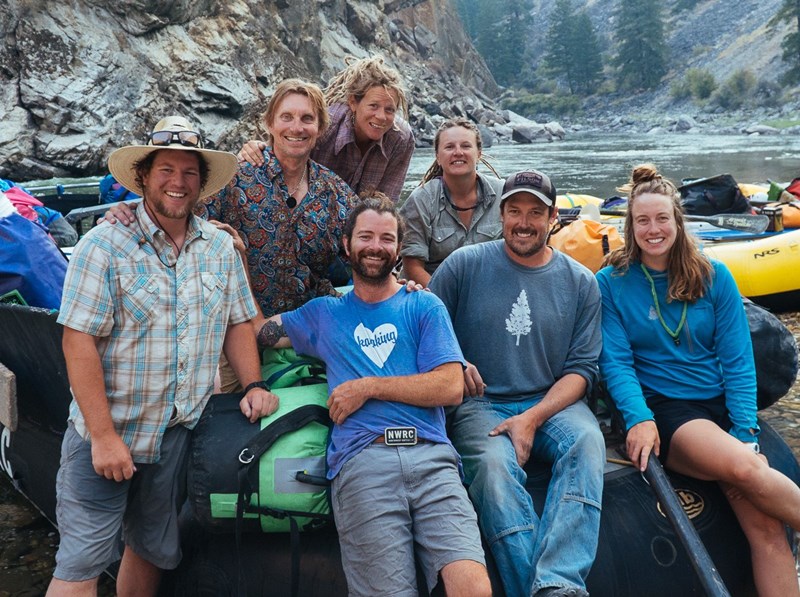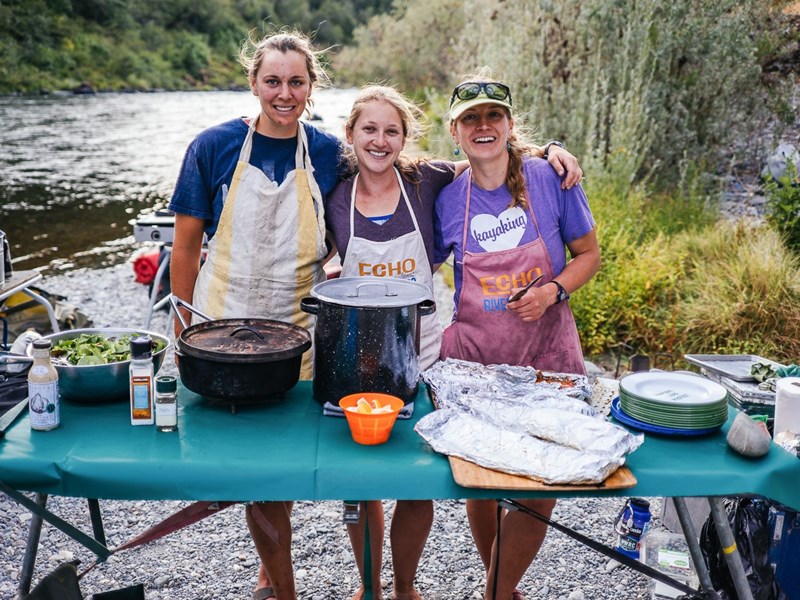By: Alexandra Thevenin, Arizona Raft Adventures and Emily Ambrose, Engage Coaching & Consulting
When it comes to addressing the charged topics of sexism and sexual harassment, folks may clam up, get squeamish, steer the conversation in a different direction, and generally do anything to avoid it. Without talking about it directly, it continues. So, this year at the America Outdoors Conference in Salt Lake City, five outdoor enthusiasts imperfectly tackled these difficult topics in front of an eager audience of over a hundred conference goers.
Emily Ambrose, of Engage Coaching & Consulting, guided the flowing dialogue between Alexandra Thevenin, of Arizona Raft Adventures; Emerald LaFortune, transitioning director of the Redside Foundation; Steven Foy, of Nantahala Outdoor Center; and Zach Collier, of Northwest Rafting Company. These five folks came together from five different states and different organizations, not always with overt expertise but with experience and a willingness to dive in together. Building on momentum from a variety of initiatives taken sometimes slowly, always boldly by AO over the years to bring these topics to the discussable forefront, the hour and a half conversation only scraped the surface.

Tips and Considerations for your organization
What is offered below is not an overview of the session per se, but a wider conglomeration of suggestions, starting points, experiences, tips, encouragement, and “what-we-do-now” (along with some “what-we-could-have-done-then”).
When it comes to addressing the culture around sexism and sexual harassment within your organization:
-
It starts with believing.
-
Have a harassment, bullying, hazing, and anti-discrimination policy and follow it. AO has a good resource. We also recommend adding an investigation procedure to the policy.
-
Also consider a procedure for first responders receiving in-field reports (i.e. reports to trip leaders while on the trip).
-
Understand that sexism is alive and real. The first step to eliminating it is to shine light on the dark places when we’re experiencing it. Also, see Emerald Lafortune’s articles #metoooutdoorsydudes and “Don’t Harass Your Coworkers.”
-
Incorporate training into your planning, budgets, and expectations.
-
Train on what the prohibited behaviors are and what the reporting procedures are.
-
Include statistics and personal narratives (maybe retold with different details to protect the reporting party) in your trainings so peers begin to understand how disrespectful and exclusive behavior impacts their colleagues daily.
-
Train on major interventions, such as how to respond to aggressive sexual advances. Consider that some of the attraction for some predators is that “no one else knows”, and that having a different crew member address them directly puts them on notice that the crew does know.
-
Train on minor interventions, such as redirecting, asking questions, and more. The Center for Diversity in the Environment and Engage Coaching & Consulting do great trainings on interrupting behavior.
-
Train on how important it is to intervene—it can put a predator on notice that their behavior won’t be tolerated here.
-
Learn about and train on microaggressions. The cumulative effects of the small things add up. Here’s a two minute introduction: “How Microaggressions are Like Mosquito Bites.” Train on checking in with peers after a microaggression, whether sexist or otherwise. “I saw George teasing you about women and motors. That’s not cool and untrue. Anything I can do?”
-
Practice these skills just like you practice other safety skills such as throw ropes and CPR.
-
It’s OK not to have all the answers. Say you don’t know, and that you will follow up; then, call your attorney before you respond to a complaint.
-
Do your research on change management and organizational development. What ways do you need to incorporate your policy into the rest of your business?
-
How are managers and leaders modeling good behavior?
-
How are managers and leaders incorporating respectful and inclusive messaging into their other messaging?
-
With what other mechanisms can you incorporate respectful and inclusive messaging and continue to follow up on harassment, bullying, hazing, etc.
-
Consider including in pre-trip safety meetings.
-
Consider including in post-trip debriefs.
-
Consider guest messaging.
-
Consider on-site signage, etc.
-
Have I mentioned training?
-
Let your staff know that you have their backs.
-
Put your guests on notice that you will hold them to a high standard of behavior. Consider incorporating a Code of Conduct all agree to: staff, guides, guests, all.
-
Men get harassed, too.
-
Think about how to make transgender folks more comfortable and welcome in your business. Consider pronouns, urination, costume bags, and more. Holistically, non-binary people get harassed and excluded even more than men and women.
-
Consider intersectionality, and think about how racism, homophobia, ageism, and more show up in your business. If that’s a new concept, that’s okay, here’s a good first resource.
-
Reach out to other people and dialogue about these topics. Be willing to share your mistakes and be compassionate about other people’s missteps so you can learn from each other.

You have a community of support
While it’s not exhaustive, it is a list to consider and to get you started and/or continue you on the needed path to address sexism, sexual harassment, and an overall culture of inclusion and respect in your organization. If you found yourself reading and thinking, this is a lot - I don’t know what I can do, start by sharing this with someone else in the company or organization; change can’t happen with just one person, so join forces.
If you find yourself looking to talk more, searching for resources, or someone who might lend an ear, our contact information is below, along with the other folks who participated in the AO session. You’re not alone and there are many people beyond this piece also committed to continuing the conversation. Look for more sessions and initiatives at AO 2020! Until then, be well and do good, in whatever ways you can.
the Panelists
Alexandra Thevenin, Arizona Raft Adventures
Owner / General Manager
Contact: alex@azraft.com
Emily Ambrose, Engage Coaching & Consulting, LLC
Owner / Consultant / Trainer
Contact: emily@engagecoachingandconsulting.com
Emerald LaFortune, Redside Foundation
Outgoing Director / Guide for Various Middle Fork Fishing/Whitewater Outfitters
Published Outdoor Writer
Contact: emerald.lafortune@gmail.com
Steven Foy, Nantahala Outdoor Center
General Manager of Outpost Operations
Contact: steven.foy@noc.com
Zach Collier, Northwest Rafting Company
Owner/Outfitter
Contact: zach@nwrafting.com